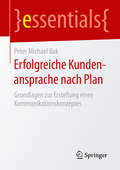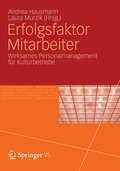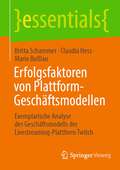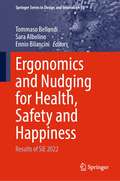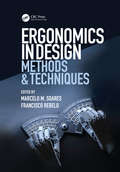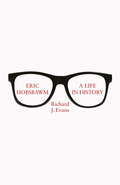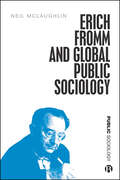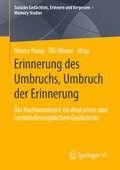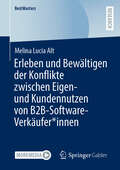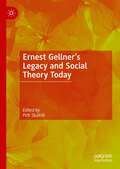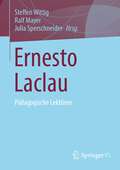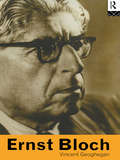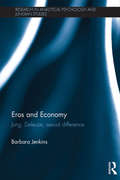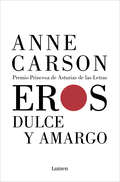- Table View
- List View
Erfolgreich selbständig
by Werner Gross Andreas Goshöfer-NeubertDieses erste "Service"-Fachbuch für Psychologen liefert einen Leitfaden für die Existenzgründung in den verschiedenen Berufsfeldern der Psychologie. Der Autor, niedergelassener Psychotherapeut und Experte für Existenzgründung, beantwortet alle wesentlichen Fragen: von der Eignung für das selbständige Arbeiten über Finanzierungsmöglichkeiten, den Gründungsprozess bis zu Detailfragen wie Honorargestaltung. Außerdem werden die verschiedenen Tätigkeitsfelder für Psychologen - diplomiert oder mit Bachelor/ Master-Abschluss - vorgestellt.
Erfolgreiche Kundenansprache nach Plan: Grundlagen zur Erstellung eines Kommunikationskonzeptes (essentials)
by Peter Michael BakIndiesem essential erläutert Peter MichaelBak, wie ein Kommunikationskonzept für ein Produkt, eine Marke, eineDienstleistung oder eine Veranstaltung geplant sowie entwickelt wird und dabeidie wesentlichen Erfolgskriterien berücksichtigt werden. WerbepsychologischeGrundlagen und Praxistipps am Ende der einzelnen Kapitel bieten darüber hinausnützliche Hilfestellung für die eigene Arbeit. Damit sind die Ausführungen füralle interessant, die im Studium, in der Ausbildung oder bereits in Agenturenoder in Unternehmen mit der Aufgabe betraut sind, eine erfolgreicheKommunikationsmaßnahme planen und umsetzen zu müssen. Ganz gleich, ob es um(neue) Produkte und Dienstleistungen, Events oder News geht, erst einesorgfältige Planung von geeigneten Maßnahmen macht den Erfolg möglich.
Erfolgreiches Forschen im Sportstudium: Von der Idee zur Präsentation der Ergebnisse
by Frank Hänsel Fabienne Ennigkeit Julia M. Kornmann Klaus BösQuantitative Forschungsmethoden sind das A und O für sportwissenschaftliche Studien und Projekte. Doch wie gestaltet man den Forschungsprozess erfolgreich? Dieses praxisnahe Lehrbuch begleitet dich Schritt für Schritt: Von der Formulierung präziser Hypothesen über die saubere Planung und Durchführung deiner Studie bis hin zur fundierten Auswertung und Interpretation deiner Daten. Anhand konkreter Beispiele aus verschiedenen Disziplinen der Sportwissenschaft lernst du, quantitative Methoden gewinnbringend einzusetzen und deine Ergebnisse überzeugend zu präsentieren. Das Lehrbuch wird durch zahlreiche digitale Zusatzmaterialien abgerundet, z. B. Übungsaufgaben für die einzelnen Kapitel und Datensätze zum Nachvollziehen der im Buch dargestellten Ergebnisse statistischer Analysen. Zudem können über 20 Videotutorials mithilfe der SN More Media App aufgerufen werden, die anschaulich die Nutzung der Statistiksoftware jamovi erklären. Die Autorinnen und Autoren blicken alle auf langjährige Lehrerfahrung im Bereich der quantitativen Forschungsmethoden zurück und greifen innerhalb des Buchs immer wieder typische Rückfragen von Sportstudierenden auf. Neben Studierenden finden daher auch Dozierende hilfreiche Anregungen zur erfolgreichen Vermittlung von Modulinhalten.
Erfolgreiches Führen von Mitarbeitern: Wie Organisationen ihre Mitarbeitenden langfristig motivieren und begeistern können (essentials)
by Hans H. HinterhuberDer vorliegende Band bietet einen einführenden Überblick in die grundlegenden Erfolgskriterien der Mitarbeiterführung und -motivation. Vom Grundgedanken, was Führung bedeutet, bis hin zur Darstellung nicht-delegierbarer Aufgaben wird die Frage nach den Voraussetzungen erfolgreicher Führung in Organisationen beantwortet. Denn besonders in unruhigen Zeiten bedeutet erfolgreiches Leadership nicht nur Management und Mehrwert für den Kunden, sondern auch die Gemeinschaft der Mitarbeiter stärken, sie in ihrem Bestreben motivieren und so langfristig Erfolge auf beiden Seiten sichern.
Erfolgsfaktor Mitarbeiter
by Andrea Hausmann Laura MurzikDie wichtigste Ressource im Kulturbetrieb sind die Mitarbeiter. Künstler, Wissenschaftler, technisches Personal, Servicemitarbeiter, Verwaltungspersonal - sie alle sind immanenter Teil des Gesamtbetriebs und haben ihren Anteil daran, dass in deutschen Kulturbetrieben tagtäglich Höchstleistungen vollbracht werden. Dennoch ist das Personalmanagement für Kulturbetriebe ein vergleichsweise vernachlässigtes Thema in Forschung und Praxis. Der vorliegende Band soll eine verstärkte Auseinandersetzung mit dem Thema Personalmanagement in Kunst und Kultur anregen. Behandelt werden neben aktuellen Trends und Praktiken zentrale Fragestellungen der Beschaffung, Gewinnung, Führung und Entwicklung von Mitarbeitern.
Erfolgsfaktor Socializing: Knigge für optimales Auftreten und Networken
by Lioba Werth Christopher ThumSocializing ist so bedeutsam geworden wie nie zuvor. Menschlich miteinander „zu können“, ist wichtiger denn je, da der Wettbewerb immer stärker und die Nischen immer kleiner werden. Trotz des Wunsches, es möge „leicht und locker“ sein, gilt es, Eindruck zu machen, sich zu präsentieren und Geschäfte abzuschließen. Worauf kommt es nun wirklich an? Was vom alten Knigge, den bisherigen Umgangsformen und Erfolgsfaktoren gilt noch? Wie bespielt man die moderne Berufswelt im Sinne von Socializing und Networking? In diesem informativen und unterhaltsamen Ratgeber von der Psychologie-Professorin Lioba Werth und dem Gastronomiefachmann Christopher Thum wird Ihnen gezeigt, wie Sie berufliches Socializing sowohl klassisch, modern und smart verstehen und bespielen können. Smalltalk, Networking und Etikette werden nicht als Selbstzweck, sondern als eine Art Methode dargestellt, mit der Sie in vielen unausgesprochenen Botschaften signalisieren können, wie Sie auch außerhalb der Büroumgebung mit anderen Menschen umgehen.
Erfolgsfaktoren von Plattform-Geschäftsmodellen: Exemplarische Analyse des Geschäftsmodells der Livestreaming-Plattform Twitch (essentials)
by Britta Schammer Claudia Hess Mario BoßlauDieses essential betrachtet die Erfolgsfaktoren von Plattform-Geschäftsmodellen am Beispiel der international erfolgreichen Livestreaming-Plattform Twitch. Die Funktionsweise des Geschäftsmodells wird dabei mit Hilfe einer Adaption des Business Model Canvas für zweiseitige Plattformen untersucht. Das Vorgehen für die Analyse lässt sich im Sinne eines Werkzeugkastens auf andere Unternehmen übertragen. Das Verständnis für die im Buch beschriebenen Erfolgsfaktoren von Twitch kann eigene Geschäftsmodelle inspirieren.
Erfolgsstrategie Shopper-Marketing: Digitale Touchpoints und die Macht des Verkaufs
by Peter Dräger Lars RoischDieses Buch zeigt, wie die Kundenansprache über analoge und digitale Kanäle zielgerichtet und effektiv gelingt – an allen entscheidenden Touchpoints entlang der gesamten Customer Journey.Der Kaufprozess wird durch die Digitalisierung immer dynamischer und eröffnet eine Vielzahl neuer Möglichkeiten, Zielgruppen erfolgreich anzusprechen und zu binden. Die Autoren bieten praxisnahe Strategien für ein kundenzentriertes Shopper-Marketing, das sowohl die Anforderungen des stationären Handels als auch des E-Commerce berücksichtigt. Durch die nahtlose Verzahnung von stationärem Handel, E-Commerce und Social Commerce können Sie den Vertrieb nachhaltig stärken und den Umsatz steigern.Erfahren Sie, wie Sie durch gezielte Maßnahmen an allen entscheidenden Touchpoints Kaufimpulse aktivieren und das Kundenerlebnis verbessern. Zahlreiche Praxisbeispiele und Gastbeiträge der Shopper-Experten Jasmin Pampuch und Jens Krüger (Bonsai Research) runden das Werk ab und bieten wertvolle Einblicke in die neuesten Entwicklungen im Shopper-Marketing.
Ergonomics and Nudging for Health, Safety and Happiness: Results of SIE 2022 (Springer Series in Design and Innovation #28)
by Sara Albolino Ennio Bilancini Tommaso BellandiThis book presents the best, peer-reviewed contributions from the XII Congress of the Italian Society of Ergonomics and Human Factors (SIE), held in Lucca, Italy, on May 2-4, 2022. By highlighting the latest theories and models, as well as cutting-edge technologies and applications, and by combining findings from a range of disciplines including engineering, design, robotics, management, computer science, human biology and behavioral sciences, it provides researchers and practitioners alike with a comprehensive, timely guide on human factors and ergonomics in a variety of industrial sectors, such as health care, transportation, automotive and constructions. It also offers an excellent source of innovative ideas to stimulate future discussions and developments aimed at applying knowledge and techniques to optimize system performance, while at the same time promoting health, safety, and well-being of individuals anc communities. The proceedings includes papers from researchers and practitioners, scientists and physicians, institutional leaders, managers, and policy makers that contribute to constructing the Human Factors and Ergonomics approach across a variety of methodologies, domains, and productive sectors.
Ergonomics in Action: A Practical Guide for the Workplace
by Celine McKeownThis is a reprint of 978-0-901357-47-2 Ergonomics in action: a practical guide for the workplace is a no-nonsense introduction to the principles of workplace ergonomics. The book is very user-friendly and written in a clear, jargon-free style, and gives straightforward explanations and practical examples. Useful summaries at the end of each chapter highlight key points at a glance. The book focuses on ergonomics in the design process, job design and work organisation. It covers specific areas of ergonomic importance; including hand tools, computer use and manual handling, and also addresses the complex and sometimes controversial topic of upper limb disorders. Ergonomics in action also includes a chapter on the basics of anthropometry and offers several practical case studies to illustrate the human and commercial benefits of following good ergonomic principles. As a consultant ergonomist, Celine McKeown has extensive experience of applying the principles of ergonomics to a wide variety of sectors. She also trains, advises and writes on a broad range of ergonomics and health and safety issues.
Ergonomics in Design: Methods and Techniques (Human Factors and Ergonomics)
by Francisco Rebelo Marcelo M. SoaresCurrently people deal with various entities (such as hardware, software, buildings, spaces, communities and other people), to meet specific goals while going about their everyday activities in work and leisure environments. These entities have become more and more complex and incorporate functions that hitherto had never been allocated such as automation, use in virtual environments, connectivity, personalization, mobility and friendliness. This book contributes to the analysis of human-system interactions from the perspective of ergonomics, regardless of how simple or complex they are, while incorporating the needs of users and workers in a healthy safe, efficient and enjoyable manner. This book provides a comprehensive review of the state of the art of current ergonomic in design methods and techniques that are being applied to products, machinery, equipment, workstations and systems while taking new technologies and their applications into consideration. Ergonomics in Design: Methods and Techniques is organized into four sections and 30 chapters covering topics such as conceptual aspects of ergonomics in design, the knowledge of human characteristics applied to design, and the methodological aspects of design. Examples are shown in several areas of design including, but not limited to, consumer products, games, transport, education, architecture, fashion, sustainability, biomechanics, intelligent systems, virtual reality, and neurodesign. This book will: Introduces the newest developments in social-cultural approaches Shows different ergonomics in design methodological approaches Divulges the ways that ergonomics can contribute to a successful design Applies different subjects to support the design including –ergonomics, engineering, architecture, urbanism, neuro, and product designs. Presents recent technologies in ergonomic design, as applied to product design. With the contributions from a team of 75 researchers from 11 countries, the book covers the state-of-the-art of ergonomics in a way to produce better design.
Eric Hobsbawm: A Life in History
by Sir Richard J. Evans FBA, FRSL, FRHisAt the time of his death at the age of 95, Eric Hobsbawm (1917-2012) was the most famous historian in the world. His books were translated into more than fifty languages and he was as well known in Brazil and Italy as he was in Britain and the United States. His writings have had a huge and lasting effect on the practice of history. More than half a century after it appeared, his books remain a staple of university reading lists.He had an extraordinarily long life, with interests covering many countries and many cultures, ranging from poetry to jazz, literature to politics. He experienced life not only as a university teacher but also as a young Communist in the Weimar Republic, a radical student at Cambridge, a political activist, an army conscript, a Soho 'man about town', a Hampstead intellectual, a Cambridge don, an influential journalist, a world traveller, and finally a Grand Old Man of Letters.In A Life in History, Richard Evans tells the story of Hobsbawm as an academic, but also as witness to history itself, and of the twentieth century's major political and intellectual currents. Eric not only wrote and spoke about many of the great issues of his time, but participated in many of them too, from Communist resistance to Hitler to revolution in Cuba, where he acted as an interpreter for Che Guevara. He was a prominent part of the Jazz scene in Soho in the late 1950s and his writings played a pivotal role in the emergence of New Labour in the late 1980s and early 1990s.This, the first biography of Eric Hobsbawm, is far more than a study of a professional historian. It is a study of an era.
Erich Fromm and Global Public Sociology (Public Sociology)
by Neil McLaughlinErich Fromm was one of the most influential and creative public intellectuals of the twentieth century. He was a mentor to David Riesman and an inspiration for the New Left. As the rise of global right-wing populism and Trumpism creates new interest in the kind of psycho-social writing and popular sociology that Fromm pioneered in the 1930s, this timely book tells the story of the rise, fall and contemporary revival of Fromm’s theories. Drawing from empirical work, this is an invaluable contribution to popular debates about current politics, the sociology of ideas and the prospect of a truly global public sociology.
Erich Fromm: A Contemporary Introduction (Routledge Introductions to Contemporary Psychoanalysis)
by Sandra BuechlerIn this passionate volume, Sandra Buechler introduces Erich Fromm's groundbreaking contributions to psychoanalysis, sociology, philosophy, political action, and social criticism. | Buechler explores how Fromm's thinking and interdisciplinary vision are able to frame discussions of dilemmas in contemporary society. She offers a comprehensive biography of Fromm, before delving into his role as analyst, author, activist, sociologist and philosopher. From her own experience as a psychoanalyst, and from the testimony of Fromm's many ardent followers, Buechler illuminates Fromm's capacity to inspire. She considers how Fromm's writing equips students, beginning clinicians and more experienced professionals to understand what can give meaning to their efforts on behalf of troubled individuals, their riven communities, and the wider world. | Assuming no prior knowledge of Fromm's work, this books offers students in clinical and social psychology, sociology, and philosophy a vital insight into his theoretical contributions. It will also be of interest to psychoanalysts, psychologists and social workers.
Erika Landau’s Contribution to the History of Gifted Education: Family Characteristics of Gifted Children
by Hanna DavidThis book describes some of the most critical issues in gifted education, i.e., gender inequity concerning giftedness examinations and the boys/girls ratio. The book also discusses the background of the gifted child's family, including their parents&’ education and number of their siblings. The book&’s findings are based on quantitative studies concerning 5–15-year-old gifted children participating at the Erika Landau Institute for Gifted and Creative Children and Youths in Tel Aviv, Israel, from 1968 until 2003. It discusses aspects such as the advantages of affirmative action standards in gifted education because girls who score lower than boys on the admission test to a gifted program usually have better social skills, persistence, and fine motor skills and, thus, integrate successfully in a gifted group with boys of higher intelligence. The book's second part addresses Landau's academic work in multiple languages and offers a critique that helps educators and mental health experts build gifted programs.
Erinnerung des Umbruchs, Umbruch der Erinnerung: Die Nachwendezeit im deutschen und ostmitteleuropäischen Gedächtnis (Soziales Gedächtnis, Erinnern und Vergessen – Memory Studies)
by Hanna Haag Till HilmarWem gehört die ostdeutsche Nachwendezeit? Diese Frage steht zunehmend im Zentrum politischer Polarisierungsprozesse und Wertkonflikte in Deutschland. Seitdem sich die Alternative für Deutschland (AfD) als „Stimme“ des Ostens erfunden hat – „Wende 2.0“ plakatierte die Partei im Osten bei den Landtagswahlen 2019 – erhielt der Deutungskampf um die Erinnerung an die friedliche Revolution von 1989/90 und die Transformation von DDR-Staatssozialismus zur bundesdeutschen Marktwirtschaft eine neue Qualität.Dieser Band trägt sozialwissenschaftliche Perspektiven zusammen, die die Hintergründe dieser Entwicklungen erhellen und stellt den „ostdeutschen Sonderfall“ in Relation zu ostmitteleuropäischen Transformationsprozessen.Die Nachwendezeit ist heute selbst ein Raum der Erinnerung: Schlüsselerfahrungen der 1990er Jahre werden mit Bedeutungen versehen, die über den Erfahrungshorizont von Einzelpersonen hinausweisen.
Erleben und Bewältigen der Konflikte zwischen Eigen- und Kundennutzen von B2B-Software-Verkäufer*innen (BestMasters)
by Melina Lucia AltVerkäufer*innen in der B2B-Softwarebranche stehen im digitalen Zeitalter mehr denn je vor der Herausforderung, die Bedürfnisse ihrer Kund*innen und ihre eigenen Interessen abzuwägen. Dieses Buch beschäftigt sich mit der Frage, wie Verkäufer*innen diesen Konflikt erleben und wie sie ihn bewältigen. Außerdem wird der Einfluss ihrer Führungskräfte betrachtet. Mit den Methoden der reflexiven Grounded Theory wird die deutsche Softwareindustrie betrachtet und aus der Praxis ein realitätsnahes Modell abgeleitet. Dabei zeigt sich, dass vielfältige Faktoren Vertriebskonflikte und persönliche Belastungen beeinflussen und dass insbesondere die Abhängigkeit zwischen Vertriebspartnern und Softwareherstellern ein bislang vernachlässigtes Forschungsfeld ist. Dieses Buch liefert Erkenntnisse für die Berufspraxis von Personaler*innen, Entscheider*innen und Führungskräften in der Softwarebranche.
Ernest Gellner’s Legacy and Social Theory Today
by Petr SkalníkThis edited volume examines the critical issues of the 21st century through the prism of Ernest Gellner’s work. The contributors look critically at Gellner´s legacy, questioning whether he remains an inspiration for today’s social theorists. Chapters proactively probe Gellner’s thoughts on a variety of pressing topics—modernity, postcolonialsm, nationalism, and more—without losing sight of current debates on these issues. This volume further brings these debates to life by having each chapter followed by a comment by an academic peer of the chapter author, thus transforming the text into a lively and dynamic conversation.
Ernesto Laclau: Pädagogische Lektüren
by Ralf Mayer Steffen Wittig Julia SperschneiderDer Band diskutiert ausgewählte Positionen der Theoriebildung Ernesto Laclaus, die in den letzten Jahren im Kontext demokratietheoretischer Debatten zwar in politik-, kultur- und sozialwissenschaftlichen Feldern rezipiert wurde, deren Aufnahme in erziehungswissenschaftlichen Debatten aber eher als ‚handverlesen‘ bezeichnet werden könnte. Die Rezeption beschränkt sich häufig auf spezifische Einsätze rund um die gemeinsam mit Chantal Mouffe in Hegemonie und radikale Demokratie entwickelte und an Antonio Gramsci ansetzende Hegemonietheorie. Dass Laclaus Perspektiven jedoch eine Vielzahl produktiver Anschlüsse und Irritationen für unterschiedliche pädagogische Frage- und Problemstellungen beinhalten, verdeutlichen die hier versammelten Beiträge rund um transdisziplinäre Spannungsverhältnisse von Politik, Bildung und Pädagogik, von Artikulation und Repräsentation, von Ontologie und Identität oder im Kontext aktueller Sichtweisen auf Inklusion, Solidarität, Migration, pädagogische Beziehungen und Professionalität.
Ernesto's Ghost
by Edward GonzalezSet against a backdrop of real people and events, Ernesto's Ghost is more than an espionage thriller or historical novel about Cuba. It is about moral choices-the moral choices made by the novel's central character, Professor David Diamond, when he discovers the dark side of the revolution, and the choices made by the other principal characters regarding their revolutionary commitment, their loved ones, and their professionalism. The time is 1974. A possible rapprochement between the United States and Cuba is in the offing following Nixon's resignation. But Henry Kissinger and the State Department are receiving mixed signals from Havana. On the eve of his trip to Cuba, the CIA tries to enlist Diamond in sorting out Fidel Castro's real intentions. The novel follows Diamond in Cuba as he begins to doubt the revolution only to fall in love with the stunning Catalina Cruz. It traces Catalina's own struggle in getting over the death of her beloved Ernesto, the epitome of Cuba's new man, and in ultimately questioning her government's policies. And it is a tale of the two lovers fending off Cuba's all-powerful state and the Comandante himself. On still other levels Ernesto's Ghost follows the dedication and courage of two intelligence officers-the CIA's Rudy Garcya and Joaquyn Acosta of Cuba's State Security-who are guided more by their own moral compasses than by the dictates of their governments. It is also about a revolution gone astray and the conceit of idealism that blinded so many of its followers. Finally, Ernesto's Ghost takes the reader through a labyrinth of political intrigue, with its concluding chapters full of unexpected twists and revelations, with mounting tension and suspense. It will appeal to those who enjoy popular fiction, as well as those interested in learning more about international politics and a major political phenomenon of our times.
Ernst Bloch
by Vincent GeogheganErnst Bloch is perhaps best known for his subtle and imaginative investigation of utopias and utopianism, but his work also provides a comprehensive and insightful analysis of western culture, politics and society. Yet, because he has not been one of easiest of writers to read his full contribution has not been widely acknowledged. Block developed a complex conceptual framework, and presented this in a prose style which many have found to verge on the impenetrable. In this critical and accessible introduction to one of the most fascinating thinkers of the twentieth century, Vincent Geoghegan unravels much of the mystery of the man and his ideas.
Eros and Economy: Jung, Deleuze, Sexual Difference (Research in Analytical Psychology and Jungian Studies)
by Barbara JenkinsEros and Economy: Jung, Deleuze, Sexual Difference explores the possibility that social relations between things, partially inscribed in their aesthetics, offer important insights into collective political-economic relations of domination and desire. Drawing on the analytical psychology of Carl Jung and the philosophy of Gilles Deleuze, this book focuses on the idea that desire or libido, overlaid by sexual difference, is a driving force behind the material manifestations of cultural production in practices as diverse as art or economy. Re-reading the history of capitalism and aesthetics with an awareness of the forces of sexual difference reveals not just their integral role in the development of capitalist markets, but a new understanding of our political-economic relations as humans. The appearance of the energies of sexual difference is highlighted in a number of different historical periods and political economies, from the Rococo period of pre-revolutionary France, to the aesthetics and economics of Keynesian Bloomsbury, to our contemporary Postmodern sensibility. With these examples, Jenkins demonstrates that the very constitution of capitalist markets is affected by the interaction of these forces; and she argues that a conscious appreciation and negotiation of them is integral to an immanent, democratic understanding of power. With its unique application of Jungian theory, this book provides important new insights into debates surrounding art, aesthetics, and identity politics, as well as into the quest for autonomous, democratic institutions of politics and economics. As such, this book will appeal to researchers, academics and postgraduate students in the fields of Jung, psychoanalysis, political economy, cultural studies and gender studies, as well as those interested in the field of cultural economy.
Eros dulce y amargo
by Anne CarsonLa gran meditación sobre el amor, el deseo y los celos, de la autora de La belleza del marido, Premio Princesa de Asturias de las Letras 2020 «Leería cualquier cosa que Anne Carson escribiera.»Susan Sontag«Una escritora deslumbrante.»Harold Bloom«Brillante y llena de ingenio, apasionada y profundamente conmovedora.»Michael Ondaatje ¿Cómo nos enamoramos? ¿Cómo surge el deseo erótico? ¿Por qué amor y odio convergen en él? Con la gracia y la brillantez que definen su poesía, Anne Carson desentraña los orígenes del deseo y sus contradicciones explorando la figura de Eros desde Safo de Lesbos -quien lo describió como «dulce y amargo»- o Platón, hasta Madame Bovary, Ana Karenina o nuestra Regenta. Helenista de formación, la escritora canadiensenos lleva hasta el origende nuestra cultura y de nuestra condición humana para iluminar problemas de nuestro tiempo en un gran ensayo, idóneo para iniciarse en su obra o para reencontrarse con ella. La crítica ha dicho...«Con un estilo profundo pero a la vez atractivo y dotado de amenidad, Carson parte de las palabras de la poeta Safo para rastrear los orígenes y el sentido del deseo. [...] Merece la pena entrar en el universo que plantea Carson, siempre impregnado de poesía, un mundo tan particular como poderoso.»Telva «Hay que leerla para rastrear el enigma de la belleza y el sexo. [...] Carson se reconoce en la esencia de la Antigua Grecia y la condensa en la luz de las cocinas y sus desayunos, en la nieve y en el bosque, en las conversaciones dolorosas, en las despedidas extrañas, en las páginas de los libros que enumera o en las citas de los versos que le ayudan a fabricar la textura inquietante de su propio universo.»Ana Merino, El Mundo «Letraherida por la literatura griega, Anne Carson ha dedicado su vida a indagar en los clásicos, a quienes nos acerca con singular talento: [...] Carson tiene el poder de hacer coincidir a Helena de Troya o Hércules con iconos occidentales como Marilyn Monroe. La llegada a las librerías de Eros dulce y amargo es una celebración. Y es que en esto del amor y el deseo, seguimos en manos de Afrodita.»Harper's Bazaar «Ha alcanzado unas cotas de intensidad y solvencia intelectual que la sitúan entre los escritores más destacados del presente. Desde el estudio grecolatino ha construido una poética innovadora donde la vitalidad del gran pensamiento clásico funciona a la manera de un mapa que invita a dilucidar las complejidades del momento actual. Su obra mantiene un compromiso con la emoción y el pensamiento, con el estudio de la tradición y la presencia renovada de las Humanidades como una manera de alcanzar mejor conciencia de nuestro tiempo.»Jurado del Premio Princesa de Asturias de las Letras «Un premio merecidísimo para una futura Nobel.»César Antonio Molina, ABC «Carson tiene un estilo por el que cualquier poeta sería capaz de matar.»The New York Times Book Review «La voz más respetada hoy de las letras anglosajonas, una de las grandes.»Elena Hevia, El Periódico «Una de las escritoras más exquisitas, radicales y eruditas de la literatura actual, dueña de una obra poliédrica, [...] hipnótica.»Miguel Lorenci, EFE «La poeta que habla con los dioses.»Luis Alemany, El Mundo «Un asombroso hojaldre de sentimientos encontrados, de reflexiones a menudo contradictorias sobre la belleza [...], sobre el amor, sobre la sinceridad, sobre el deseo.»Ignacio Echevarría, El Cultural de El Mundo (sobre La belleza del marido)
Eros: Beyond the Death Drive
by Rosaura Martínez RuizEros considers a promise left unfulfilled in Sigmund Freud’s Beyond the Pleasure Principle. Rosaura Martínez Ruiz argues that when the pleasure principle comes into contact with the death drive (the human tendency toward aggression or cruelty), the psyche can take detours that, without going beyond the limit of the pleasure principle, can nevertheless defer it. Eros reflects on these deviations of the pleasure principle, in the political sphere and in the intimate realm. Following these erotic paths, Martínez argues that the forces of the death drive can only be resisted if resistance is understood as an ongoing process. In such an effort, erotic action and the construction of pathways for sublimation are never-ending ethical and political tasks. We know that these tasks cannot be finally accomplished, yet they remain imperative and undeniably urgent.If psychoanalysis and deconstruction teach us that the death drive is insurmountable, through aesthetic creation and political action we can nevertheless delay, defer, and postpone it. Calling for the formation and maintenance of a “community of mourning duelists,” this book seeks to imagine and affirm the kind of “erotic battalion” that might yet be mobilized against injustice. This battalion’s mourning, Martínez argues, must be ongoing, open-ended, combative, and tenaciously committed to the complexity of ethical and political life.
Erotic Capital: The Power of Attraction in the Boardroom and the Bedroom
by Catherine HakimIn 2010, pioneering sociologist Catherine Hakim shocked the world with a provocative new theory: In addition to the three recognized personal assets (economic, cultural, and social capital), each individual has a fourth asset-erotic capital-that he or she can, and should, use to advance within society. In this bold and controversial book, Hakim explores the applications and significance of erotic capital, challenging the disapproval meted out to women and men who use sex appeal to get ahead in life. Social scientists have paid little serious attention to these modes of personal empowerment, despite overwhelming evidence of their importance. In Erotic Capital, Hakim marshals a trove of research to show that rather than degrading those who employ it, erotic capital represents a powerful and potentially equalizing tool-one that we scorn only to our own detriment.

